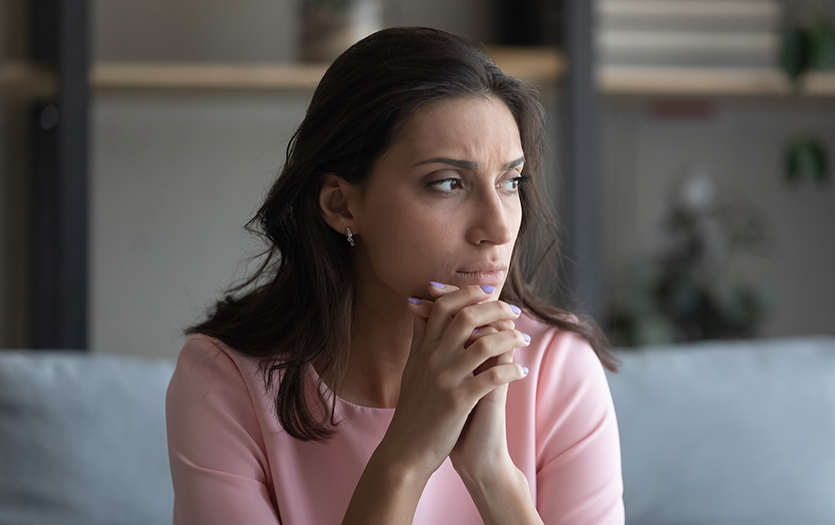
This post was written by Stephanie Subart, PharmD, Parkview Health.
Anxiety disorders are among the most common health conditions, affecting millions of people worldwide. Physical symptoms like rapid heart rate, trembling and excessive sweating can exacerbate these feelings, making them challenging to manage. While well-known medications like benzodiazepines (alprazolam/Xanax™ and lorazepam/Ativan™) are effective for some, concerns about dependence or addiction lead many to seek safer alternatives. Fortunately, there are a variety of treatment options available to help manage anxiety without the risk of chemical dependency or withdrawal symptoms.
What classifies a medication as non-addictive?
According to the National Institute on Drug Abuse, a non-addictive medication is one that:
-
Does not lead to physical dependence: The body does not become reliant on the drug, and discontinuing the medication does not lead to withdrawal symptoms.
-
Has low potential for abuse: The medication does not trigger the same "high" or euphoric feelings that drugs with addictive potential may be able to cause, especially in high doses.
-
Does not cause cravings: A non-addictive medication does not induce a desire to keep taking it in a way that leads to compulsive use.
Non-addictive anxiety medications
Beta-blockers
Beta-blockers treat cardiac conditions such as heart failure, high blood pressure or arrhythmias. However, they can also help manage the bodily symptoms of performance anxiety, social anxiety or stressful situations.
-
How they work: Beta-blockers alleviate anxiety by reducing the physical symptoms associated with the fight or flight response caused by heightened adrenaline levels. These symptoms include increased heart rate, blood pressure, tremors and sweating. They work quickly, providing fast relief in acute scenarios, but are not suitable for long-term anxiety management.
-
Why they are non-addictive: Beta-blockers are not habit-forming because they don't affect the brain's mood-regulating systems in the same way that other anxiety medications like benzodiazepines do. They specifically target the physical symptoms of anxiety without causing any psychological dependence.
Examples of beta-blockers include propranolol (Inderal™), atenolol (Tenormin™) and metoprolol (Lopressor™).
Selective serotonin reuptake inhibitors (SSRIs)
SSRIs are often the first line of treatment for mental health conditions like anxiety, depression, panic disorder, social anxiety and other anxiety-related conditions.
-
How they work: SSRIs raise levels of serotonin, also known as the happy chemical. By increasing the availability of this hormone in the brain, SSRIs work to elevate mood and alleviate anxiety. Since these medications can take up to three weeks to reach full effectiveness, they are better suited for ongoing management rather than immediate relief.
-
Why they are non-addictive: SSRIs don't produce the same euphoric or intensely pleasurable effects as addictive substances like opioids or stimulants. Side effects may include nausea, sexual dysfunction or sleep disturbances.
Examples of SSRIs include sertraline (Zoloft™), escitalopram (Lexapro™), and fluoxetine (Prozac™)
Serotonin-norepinephrine reuptake inhibitors (SNRIs)
SNRIs are often used to treat generalized anxiety disorder, panic disorder and social anxiety. They are also effective in managing the physical symptoms of anxiety, such as rapid heartbeat or muscle tension, due to the action on norepinephrine.
-
How they work for anxiety: Like SSRIs, SNRIs increase the levels of serotonin in the brain. However, they also increase norepinephrine, a neurotransmitter involved in the body's stress response and mood regulation. By boosting both chemicals, SNRIs can be particularly helpful for anxiety and depression.
-
Why they are non-addictive: SNRIs do not cause physical dependence or cravings, making them non-addictive. They are safe for long-term use and are generally well-tolerated but may cause side effects like dizziness, insomnia or gastrointestinal issues in some people.
Examples of SNRIs include venlafaxine (Effexor XR™) and duloxetine (Cymbalta™)
Buspirone (Buspar™)
Buspirone is particularly effective for generalized anxiety disorder (GAD) and is suitable for individuals who prefer a non-sedating option to relieve their constant, daily anxiety.
-
How it works for anxiety: Buspirone is a serotonin receptor agonist, meaning it mimics the effects of serotonin in a way that calms the brain without producing the sedative effects of benzodiazepines. It also works gradually, requiring two to three weeks before it is fully effective.
-
Why it is non-addictive: Buspirone has no sedative effects and doesn't cause a "high," making it non-addictive. Unlike benzodiazepines, it doesn't lead to the need for higher doses or physical dependence. This makes it a safer long-term option for people who want to avoid the risk of addiction.
Hydroxyzine Pamoate (Vistaril™)
Hydroxyzine is an antihistamine used to relieve itching caused by allergic skin reactions. When taken alone or with other medications for immediate but short-term anxiety management during acute episodes or while waiting for the effects of slower-acting medications like SSRIs or SNRIs.
-
How it works: Hydroxyzine blocks histamine receptors in the brain, which can help ease feelings of anxiety and promote relaxation.
-
Why it is non-addictive: Hydroxyzine is not habit-forming and does not carry the risk of addiction or withdrawal symptoms. While it causes drowsiness, it does not lead to needing higher doses to achieve the same effect as benzodiazepines.
Non-pharmacological options
When treating anxiety, medication is often most effective when combined with positive lifestyle adjustments and stress reduction strategies. Here are some of the most widely recommended approaches:
-
Psychotherapy - Cognitive behavioral therapy (CBT) remains one of the most influential and long-lasting treatments for anxiety. It helps individuals identify and challenge negative thought patterns that contribute to anxiety and develop healthier coping strategies.
-
Regular exercise - Engaging in physical activities such as walking, yoga, cycling or swimming release endorphins, which can boost mood and reduce stress. Aim for at least 150 minutes of moderate exercise each week.
-
Sleep - A lack of restorative sleep can worsen anxiety, so maintaining good sleep habits is essential. Good sleep hygiene includes sleeping 7-9 hours per night, limiting screen time before bed and establishing a regular bedtime routine.
-
Stress management - Mindfulness exercises, meditation and deep breathing can help calm the body and mind. Mindfulness encourages staying present in the moment instead of worrying about past or future events. Additionally, breathing exercises such as the 4-7-8 technique (inhale for 4 seconds, hold for 7, exhale for 8) can help calm the nervous system.
Final thoughts
Anxiety treatments are not one-size-fits-all. Finding the right combination of remedies requires collaboration between healthcare providers who can tailor a plan to meet your individual needs.
At Parkview Outpatient Pharmacies our dedicated team works directly with your doctor to ensure medication appropriateness and safety. Contact your preferred Parkview outpatient pharmacy, and our staff will gladly assist you with questions or prescription transfers.
Additional resources
-
NIDA. 2018, June 6. Understanding Drug Use and Addiction Drug Facts. Retrieved from https://nida.nih.gov/publications/drugfacts/understanding-drug-use-addiction on 2024, November 10
-
Stein, M. B., & Sareen, J. (2015). Generalized anxiety disorder. New England Journal of Medicine, 373(21), 2059–2068. https://doi.org/10.1056/NEJMcp1502514
-
Baldwin, D., et al. (2014). The role of beta-blockers in anxiety disorders. European Neuropsychopharmacology, 24(9), 1467-1476. https://doi.org/10.1016/j.euroneuro.2014.06.001
-
Wetherell, J.L., et al. (2015). Psychological and pharmacological treatments for generalized anxiety disorder. Current Psychiatry Reports, 17(7), 1-11. https://doi.org/10.1007/s11920-015-0607-7



